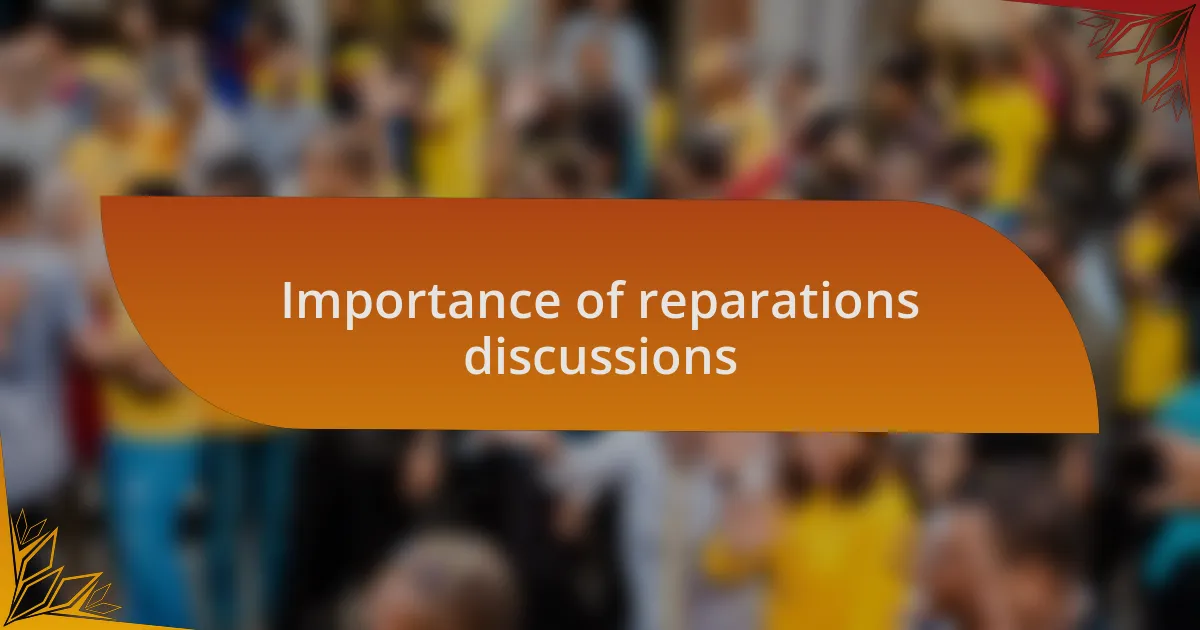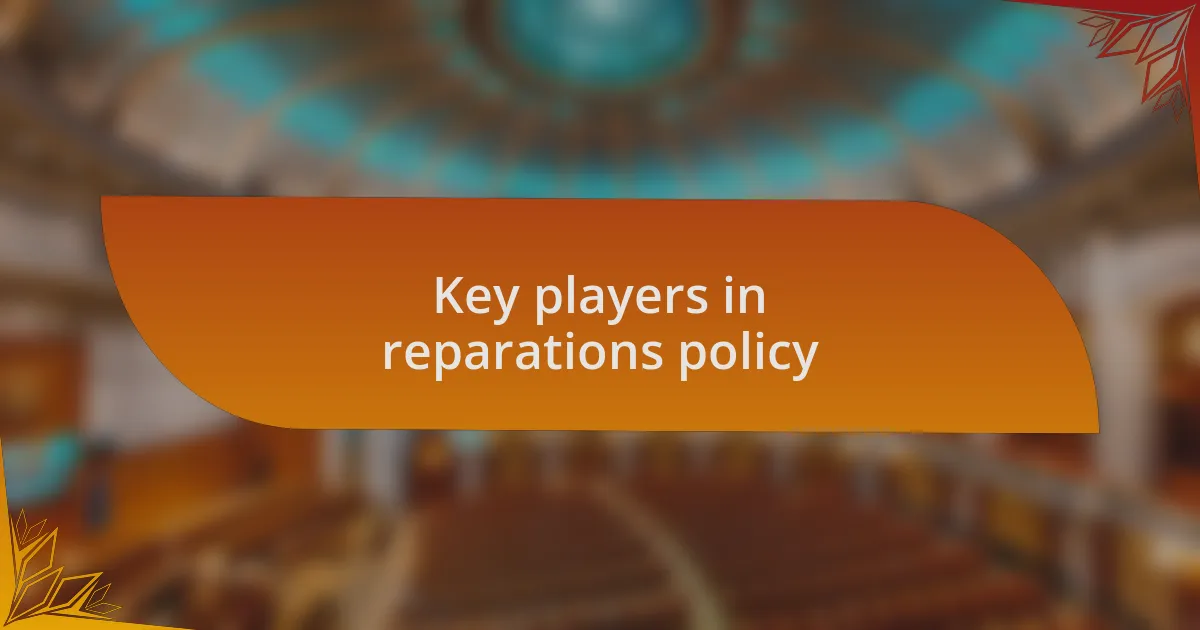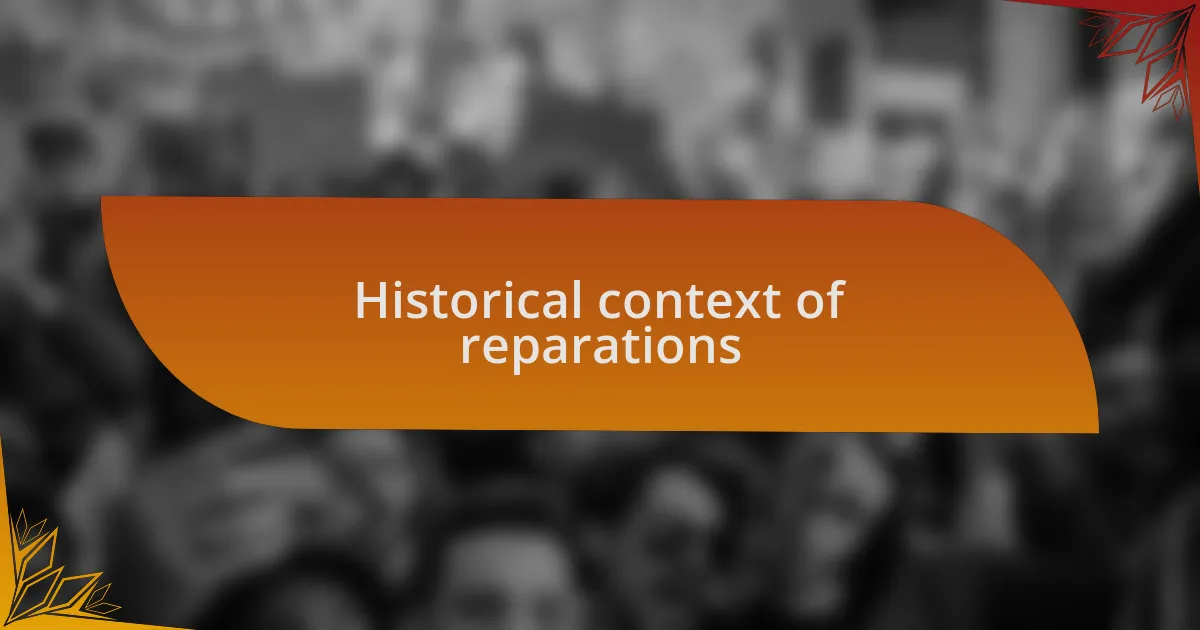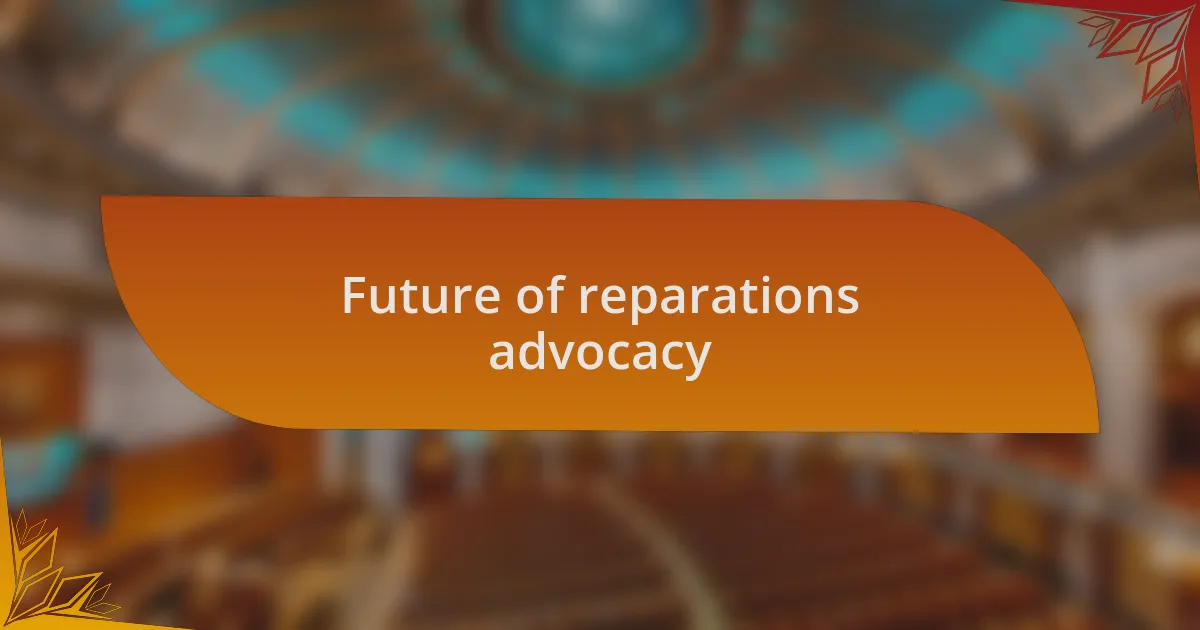Key takeaways:
- Reparations discussions are critical for acknowledging historical injustices and fostering community healing and understanding.
- Key players in reparations policy include activists, scholars, and legislative leaders, each contributing vital perspectives and experiences.
- Historical context reveals that reparations have long been tied to systemic oppression, and past dialogues can inform present-day efforts.
- Future advocacy for reparations will likely involve broadening the scope to include various systemic inequalities and leveraging technology for engagement.

Understanding reparations politics
Reparations politics is deeply intertwined with our collective memory and historical injustices. I often find myself pondering—how do we reconcile the past with our aspirations for a just future? Listening to those affected by systemic inequalities reveals the profound emotional weight of this discussion; stories of pain and resilience evoke a deep sense of urgency.
As I interact with policymakers, I see the complexity of their decisions and the passionate debates that swirl around us. It’s not just about financial compensation; it’s about acknowledging historical wrongs and fostering healing within communities. I remember an illuminating conversation with a reparations advocate who emphasized that every policy should reflect the lived experiences of those it seeks to serve, making it clear that this topic is as much about human connection as it is about policy frameworks.
The question arises: can monetary reparations alone address the scars of history? From my observations, while financial reparations can provide significant support, the real challenge lies in shifting societal perceptions and fostering broader understanding of the injustices faced. It’s a multi-layered dialogue, one that requires empathy and engagement from all corners of our society to truly move forward.

Importance of reparations discussions
Reparations discussions are crucial because they shine a light on the historical injustices that many marginalized communities have endured. I remember sitting in a group discussion where a participant shared how their family had been affected by discriminatory policies. It was a vivid reminder that reparations are not just theoretical – they represent a pathway to acknowledging real pain and suffering, urging us to confront uncomfortable truths about our history.
Engaging in these discussions helps dismantle the stigma surrounding reparations and promotes understanding of their importance. It struck me during a recent policy forum that many attendees were unaware of the profound implications that reparations policies can have on social fabric. Addressing these issues can foster a sense of community and solidarity, proving that dialogue is a powerful tool for healing and understanding.
Moreover, the importance of these conversations lies in their ability to empower communities. After attending a workshop on reparations, I was left reflecting on how such initiatives could inspire individuals to reclaim their narratives. When people feel heard and acknowledged, it can lead to a transformative impact, instilling hope and a desire to participate actively in shaping a more equitable society.

Key players in reparations policy
In the realm of reparations policy, key players include government officials, activists, and scholars, each bringing unique perspectives and experiences to the conversation. I remember an intense debate at a recent summit where a renowned scholar passionately articulated the economic foundations for reparations. It made me realize how essential their expertise is in shaping policies that not only address historical wrongs but also lay the groundwork for future economic justice.
Another critical group consists of grassroots activists who often serve as the heartbeat of the reparations movement. I recall attending a local rally, where individuals shared personal stories about the generational harm inflicted by systemic racism. Their voices resonated deeply with the crowd, illustrating how their advocacy forms a foundation for policy proposals that reflect the lived experiences of those directly affected.
Lastly, legislative leaders play a pivotal role in translating reparations discussions into actionable policies. I once had the opportunity to meet a city council member devoted to introducing reparations initiatives. Their commitment reminds me that while ideas can spark conversations, it’s the determination of these lawmakers that can catalyze real change, making reparations a tangible reality for communities yearning for justice.

Historical context of reparations
The concept of reparations has its roots in historical injustices, where societies have grappled with compensating victims of systemic oppression. I recall reading about the reparations initiated in Germany post-World War II for the Holocaust survivors; it made me reflect on the complexities involved in recognizing wrongs and offering tangible restitution. This example demonstrates that reparations are not merely financial transactions but an attempt to acknowledge pain and foster healing.
In the United States, discussions around reparations have long been tied to the legacy of slavery and the ongoing impact of racial discrimination. I once attended a lecture where a speaker shared powerful testimonies from descendants of enslaved individuals, emphasizing how the absence of reparative justice has perpetuated economic disparities. It raised a poignant question: how can a society truly thrive when a significant portion of its population is still grappling with the repercussions of its past?
Looking further back, the aftermath of the Civil War sparked discussions about reparations, as freed Black Americans sought compensation for their unpaid labor. I found it striking how, even then, the dialogue around reparations was met with resistance and skepticism. It prompts me to ask: what lessons can we learn from these historical contexts to inform present-day policies? Understanding this lineage is vital as we navigate the current reparations discourse, reminding us that the journey toward justice is often fraught with challenges but is absolutely necessary.

Lessons learned from my encounters
In my conversations with reparations policy-makers, I quickly learned that the path to meaningful change is often paved with resistance. An encounter with a local official revealed their apprehension about public opinion, and it struck me how vital it is to engage communities in this dialogue. Are we, as advocates, doing enough to bridge the gap between policymakers and the people they serve?
During a roundtable discussion, I was moved by the personal stories shared by individuals advocating for reparations. One participant recounted how their family’s history of land dispossession still shapes their current economic struggles. It made me realize that behind every statistic is a human story, and these narratives can catalyze empathy and understanding. How often do we truly listen to the lived experiences that inform policies?
Reflecting on these encounters, I grasped the importance of patience and persistence in this movement. After a particularly challenging meeting, I had a conversation with a seasoned activist who reminded me that real change takes time, but every small victory contributes to the larger goal. It left me pondering: are we prepared to commit to the long haul, understanding that our efforts today may lay the groundwork for future generations?

Future of reparations advocacy
The future of reparations advocacy appears intertwined with the continuous evolution of community engagement. I remember attending a grassroots meeting where attendees were encouraged to share their visions for reparative justice. The energy in the room was palpable, as people voiced their hopes and frustrations. This collective passion sparked an important question: how can we harness this momentum to influence more policymakers?
As I analyze upcoming trends, it’s evident that technology will play a vital role in shaping reparations discussions. I recall a fascinating webinar I participated in that utilized social media platforms to amplify voices often marginalized in policy debates. It made me wonder, can digital advocacy become a powerful tool to challenge traditional narratives and bring reparations issues to the forefront of public consciousness?
Moreover, I sense a growing recognition that reparations must encompass a broader range of restorative measures. While traditional financial compensation is often the focus, my discussions with activists have revealed a desire for policies that address systemic inequalities across education, housing, and healthcare. Reflecting on this, I ask myself: are we ready to redefine reparations to incorporate these holistic approaches and build stronger coalitions?